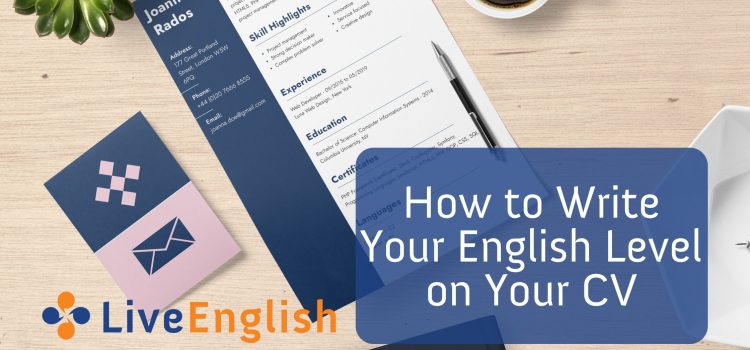
Your CV is your first impression with potential employers, so every detail matters—including how you describe your English proficiency. Yet, many job seekers fall into the trap of overestimating their abilities by writing “fluent in English,” even when they know it’s not entirely true.
This might seem harmless, but it can lead to uncomfortable situations. Imagine being asked to conduct a meeting in English only to stumble through your sentences, leaving the wrong impression on your colleagues.
On the other hand, underselling your skills can mean missing out on opportunities where your English is more than adequate for the job.
So, how can you accurately reflect your English proficiency in a way that’s both honest and strategic? In this guide, we’ll break it down step by step, helping you create a CV that presents your English skills authentically and confidently.
Why Being Honest About Your English Level Matters
Imagine you’ve written “fluent in English” on your CV and landed an interview. Now, the recruiter asks you to explain your previous job experience—in English. If your vocabulary is limited or you struggle to form coherent sentences, your confidence can plummet. Worse, the employer may start questioning other parts of your application.
Overstating your skills doesn’t just risk embarrassment; it can erode trust. Employers value honesty and a realistic understanding of your capabilities.
On the flip side, being too modest about your English skills can undersell your potential. If you’ve spent years perfecting your business email writing or leading bilingual meetings, make sure your CV reflects that!
What Does “Fluent in English” Really Mean?
“Fluent” is a term that gets thrown around a lot, but it carries specific implications. Fluency in English means more than just being able to hold a basic conversation. It involves:
– Speaking naturally and confidently without frequent pauses.
– Understanding and using idiomatic expressions and subtle cultural nuances.
– Navigating both formal business communication and casual conversations with ease.
If you find yourself hesitating, searching for words, or struggling to keep up with fast-paced discussions, it might be better to use a term other than “fluent.” That’s okay! There are other ways to describe your level that are just as impressive and more accurate.
Assess Your English Skills
1. Use CEFR Levels as a Guide
The Common European Framework of Reference for Languages (CEFR) provides a globally recognized standard for language proficiency. Levels range from A1 (Beginner) to C2 (Proficient):
– A1 and A2: You can understand and use basic phrases.
– B1 and B2: You can handle most conversations and workplace tasks.
– C1 and C2: You can express yourself effortlessly and tackle complex subjects.
Knowing your CEFR level helps you describe your abilities with confidence.
2. Break It Down by Skill
Your English proficiency might vary across speaking, listening, reading, and writing. For instance, you might excel in reading professional documents (C1) but feel less confident speaking in casual settings (B2). Highlighting these distinctions can make your CV more specific and credible.
Common Mistakes to Avoid
1. Overstating Your Skills
It’s tempting to write “fluent” when you’re not quite there. After all, it sounds impressive. But this can set unrealistic expectations, leading to awkward moments during interviews or on the job.
2. Being Vague
Phrases like “good in English” or “intermediate level” are too ambiguous. What does “good” mean? Can you negotiate a contract in English, or are you just comfortable ordering coffee while traveling? Clarity is key.
3. Ignoring Job Relevance
Not all roles require the same level of English. A customer service job might require excellent spoken English, while a technical writer might need strong written skills. Tailor your description to align with the job’s needs.
4. Overlooking Regional Nuances
If you’re applying to a company in London or Australia, familiarity with British English could be a valuable asset. Highlight your understanding of regional spelling, vocabulary, and cultural differences where relevant.
Examples of How to Write Your English Level
When it comes to writing your English proficiency, specificity is your best friend. Here are a few examples:
General Proficiency
“English: B2 (Upper-Intermediate). Confident in professional and social settings.”
“English: C1 (Advanced). Proficient in business communication and presentations.”
Breaking It Down
“English: C1 in reading and writing; B2 in speaking and listening.”
“English: Advanced. Strong technical writing skills and ability to lead discussions.”
Experience-Based Descriptions
“Conducted weekly meetings in English with international clients.”
“Presented at conferences in English, explaining technical concepts to diverse audiences.”
These descriptions go beyond just a label—they show how you’ve applied your skills in real-world situations.
What If You’re Not Fluent Yet?
Here’s the good news: You don’t have to be fluent to impress employers. Show them you’re proactive about improving. For example:
“English: Intermediate. Currently attending weekly English conversation classes.”
“English: Upper-Intermediate. Improving fluency through daily practice and online courses.”
This approach not only demonstrates your current abilities but also highlights your commitment to professional growth.
Should You Include Certifications?
Language certifications like TOEFL, IELTS, or Cambridge exams can add credibility to your CV.
They’re especially useful for roles that prioritize English skills. Include certifications with scores and dates, such as:
“TOEFL Score: 95/120 (C1 Level)”
“IELTS Band Score: 7.0 (Advanced Level)”
“Cambridge C1 Advanced Certificate: Grade B”
These qualifications show employers you’ve taken the initiative to assess and validate your skills.
A Quick Self-Check
Before adding “fluent in English” to your CV, ask yourself:
– Can I explain complex ideas clearly without relying on my native language?
– Can I write professional emails without frequent grammar mistakes?
– Can I keep up with fast-paced discussions or presentations?
If you answered “yes” to these questions, you’re likely ready to claim fluency. If not, consider a more accurate description.
Final Thoughts
Accurately describing your English proficiency on your CV is about more than honesty—it’s about setting the right expectations and positioning yourself effectively. Employers value authenticity and self-awareness, so take the time to assess your skills and present them clearly.
If you feel your English needs improvement to meet your career goals, consider joining an English course tailored to professionals. At Live English, we specialize in helping people like you achieve confidence and fluency for the workplace. Register today for a trial lesson to learn how we can help you succeed 👇 or check out our Career Bootcamp!
By following these tips, you’ll not only avoid common pitfalls but also create a CV that stands out for all the right reasons.







